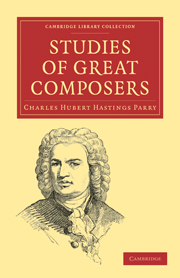IV - HAYDN
Published online by Cambridge University Press: 29 August 2010
Summary
When Bach and Handel were dead the world of music seemed vacant and dull again, just as it did after Palestrina's death. Another mountain height had been climbed, and that a great one; and, as before, the standard of music sank to much lower levels directly, and composers had to make another fresh effort in a new direction. The art was still carried on by excellent good men, but they were perfect pigmies in comparison with the two great giants who had passed away; and their work is made to seem all the smaller and more trifling by reason of certain new influences which were coming upon the world, and old feelings and enthusiasms which were dropping away. Bach and Handel were not only the last great representatives of the older forms of art, but they were the last composers in whose works the fervour which belonged to the reformed religion in its early days showed its powerful and ennobling influence. In Bach's music the essence of religion in the shape of deep and earnest feeling is always present, and in the best of Handel's music it is the same. The generation which followed them lost this great source of energy, and had nothing substantial to put in its place. What the national music of the reformed Church had been to Bach, the opera and people's songs and dances were to his successors; and in none of these was there as yet much of deep feeling or strong character. But since a new line had obviously become necessary, composers had to use what they could get to begin upon and make the best of their opportunities.
- Type
- Chapter
- Information
- Studies of Great Composers , pp. 91 - 118Publisher: Cambridge University PressPrint publication year: 2009First published in: 1887



